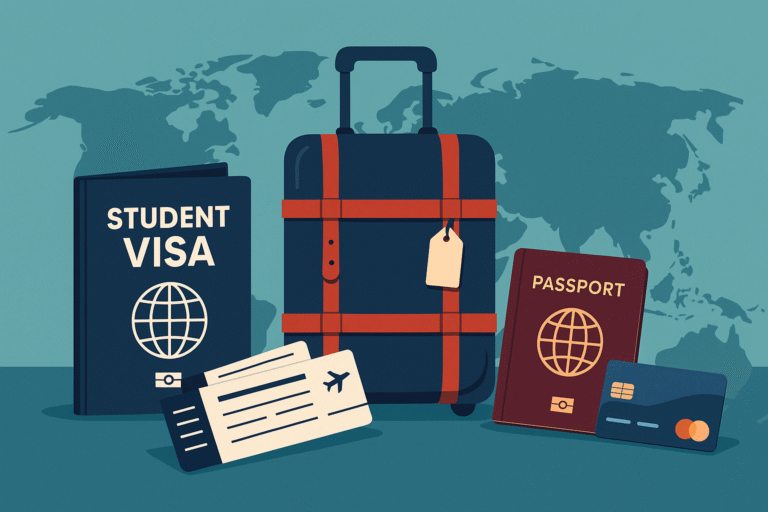What Are the Requirements to Study Abroad in 2025? A Complete Guide for International Students
Deciding to study abroad is an exciting milestone that opens doors to world-class education, cultural immersion, and global career opportunities. However, navigating the complex web of international education requirements can feel overwhelming, especially with varying admission criteria across different countries and universities.
Whether you’re pursuing undergraduate programs, seeking fully funded master’s degrees, or applying for international PhD scholarships, understanding the specific requirements for studying abroad in 2025 is crucial for your success.
This comprehensive guide breaks down everything you need to know about study abroad requirements, from academic qualifications to visa applications, helping you turn your dream of international education into reality.
The Evolving Landscape of International Education in 2025
The study abroad landscape has transformed significantly in recent years. Universities worldwide are embracing more inclusive admission policies, reducing standardized test requirements, and streamlining digital application processes. This shift has made international education more accessible to students from diverse backgrounds, creating unprecedented opportunities for those seeking quality education abroad.
With the rise of tuition-free universities in Europe, scholarship programs in Canada, and competitive admission processes in the United States, students now have more options than ever before. However, this increased accessibility comes with heightened competition, making it essential to understand and prepare for all requirements well in advance.
Essential Academic Requirements for International Students
1. Educational Credentials and Transcripts
Your academic foundation forms the cornerstone of any study abroad application. For undergraduate programs, you’ll need a high school diploma or equivalent qualification recognized by your target country’s education system. Graduate program applicants must provide a bachelor’s degree certificate along with official transcripts from all previously attended institutions.
International students should ensure their educational credentials are properly evaluated and, if necessary, converted to the grading system used in their destination country. This process, known as credential evaluation, helps universities understand your academic performance in their local context.
2. Grade Point Average (GPA) Requirements
Most universities set minimum GPA requirements for international applicants. While these standards vary by institution and program, competitive universities typically expect:
- Undergraduate programs: 3.0-3.5 GPA (or equivalent)
- Master’s programs: 3.2-3.7 GPA
- PhD programs: 3.5+ GPA
Top-tier universities and specialized programs may have higher requirements, so research your target schools thoroughly to understand their specific academic standards.
3. Course Prerequisites and Subject Requirements
Certain programs require specific prerequisite courses or subject backgrounds. For example, engineering programs may require advanced mathematics and physics, while business schools might prefer applicants with economics or statistics coursework. Review program requirements early to ensure you meet all academic prerequisites.
Language Proficiency: Your Gateway to Global Education
English Language Requirements
For programs taught in English, demonstrating language proficiency is typically mandatory. The most commonly accepted tests include:
IELTS (International English Language Testing System): Widely accepted globally, with most universities requiring scores between 6.0-7.5.
TOEFL (Test of English as a Foreign Language): Particularly popular in North American institutions, with typical requirements ranging from 80-100 iBT.
Duolingo English Test: Increasingly accepted due to its accessibility and online format, with scores typically ranging from 105-130.
Cambridge English Qualifications: Including CAE and CPE certificates, accepted by many European universities.
Language Proficiency Waivers
In 2025, more universities are offering language test waivers for students who:
- Completed previous education in English-medium institutions
- Are citizens of English-speaking countries
- Hold degrees from accredited English-speaking universities
- Demonstrate sufficient English proficiency through alternative means
Non-English Language Requirements
Students applying to programs in countries like Germany, France, or Japan may need to demonstrate proficiency in the local language through tests such as TestDaF (German), DELF/DALF (French), or JLPT (Japanese).
Documentation Requirements: Building Your Application Portfolio
Passport and Identification Documents
A valid passport with at least six months of remaining validity is essential for all international students. Some institutions also require:
- National identification cards
- Birth certificates
- Proof of citizenship or residency status
Statement of Purpose (SOP): Your Personal Narrative
Your SOP is arguably the most critical component of your application. This document should articulate:
- Your academic and career goals
- Reasons for choosing the specific program and university
- How the program aligns with your future plans
- Your interest in cross-cultural education and international perspectives
- Unique experiences and qualifications that set you apart
A compelling SOP typically ranges from 500-1000 words and should demonstrate your writing skills, critical thinking abilities, and genuine passion for your chosen field.
Letters of Recommendation
Most universities require 2-3 recommendation letters from:
- Academic supervisors or professors
- Employers or professional mentors
- Research advisors or project supervisors
These letters should highlight your academic abilities, work ethic, leadership potential, and readiness for international education. Provide recommenders with sufficient time and relevant information about your target programs.
Curriculum Vitae (CV) or Resume
Your academic CV should comprehensively showcase:
- Educational background and achievements
- Work experience and internships
- Research projects and publications
- Extracurricular activities and leadership roles
- Language skills and certifications
- Awards and honors
Even without extensive professional experience, highlight relevant volunteer work, academic projects, and personal achievements that demonstrate your potential.
Financial Requirements and Proof of Funds
Demonstrating Financial Stability
Most countries require proof that you can financially support yourself during your studies. This typically includes:
Bank Statements: Recent statements showing sufficient funds to cover tuition and living expenses.
Scholarship Letters: Documentation of any scholarships, grants, or financial aid received.
Sponsor Declarations: If family members or organizations are funding your education, provide official sponsorship letters.
Blocked Accounts: Some countries like Germany require funds to be deposited in a blocked account, accessible only after arrival.
Country-Specific Financial Requirements
- Germany: Approximately €10,332 per year in a blocked account
- Canada: Proof of funds varying by province, typically CAD $10,000-$25,000
- Australia: Evidence of AUD $21,041 per year for living expenses
- United States: Varies by institution, often requiring proof of full tuition plus living expenses
Health and Medical Requirements
Health Insurance Coverage
Most countries mandate health insurance for international students. Options include:
- University-sponsored health plans
- Private international health insurance
- Government-required insurance schemes
Research the specific health insurance requirements for your destination country and ensure coverage begins before your arrival.
Medical Examinations and Vaccinations
Many countries require:
- Recent medical examinations
- Proof of immunizations (MMR, hepatitis, tuberculosis tests)
- COVID-19 vaccination certificates
- Mental health clearances for certain programs
Health Certificates and Medical Records
Obtain official medical certificates from licensed physicians and ensure all documents are translated into the destination country’s official language if necessary.
Visa Applications: Your Legal Entry to International Education
Student Visa Types and Requirements
Student visa applications typically require:
- Completed visa application forms
- Passport-sized photographs
- University acceptance letters
- Proof of financial support
- Medical certificates and health clearances
- Police clearance certificates
- Biometric data (in some countries)
Digital Visa Applications
Many countries now offer online visa applications with faster processing times:
- Canada: Study permit applications through the Government of Canada website
- Netherlands: Online visa applications with digital document submission
- Australia: Student visa applications through the Department of Home Affairs portal
Visa Processing Times and Deadlines
Plan visa applications well in advance, as processing times vary:
- Standard processing: 4-8 weeks
- Peak season delays: Up to 12 weeks
- Express processing: Available in some countries for additional fees
Standardized Tests and Entrance Examinations
Optional Testing Policies
Many universities are adopting test-optional policies in 2025, reducing reliance on standardized tests like:
- SAT and ACT for undergraduate programs
- GRE and GMAT for graduate programs
- Subject-specific entrance exams
When Tests Are Still Required
Certain programs still require standardized tests:
- Highly competitive programs
- Professional schools (medicine, law, engineering)
- Programs with specific accreditation requirements
- Scholarship applications with testing mandates
Specialized Requirements for Creative and Technical Programs
Portfolio Submissions
Students applying for creative programs must prepare:
- Digital portfolios showcasing best work
- Artist statements explaining creative vision
- Technical specifications for submitted works
- Alternative format submissions (video, audio, interactive media)
Auditions and Practical Assessments
Music, theater, and performance programs may require:
- Live or recorded auditions
- Technical skill demonstrations
- Creative writing samples
- Portfolio presentations
Application Strategy and Timeline Management
Early Preparation Strategies
Start your application process at least 12-18 months before your intended start date:
- Research universities and programs thoroughly
- Prepare for language proficiency tests
- Gather required documents
- Build relationships with potential recommenders
- Begin drafting your statement of purpose
Multiple Applications Approach
Apply to multiple universities to increase your chances of acceptance:
- Include reach, match, and safety schools
- Diversify across different countries and programs
- Consider various funding opportunities
- Prepare for different admission requirements
Deadlines and Timeline Management
Create a comprehensive timeline including:
- Application deadlines (typically December-March for fall admission)
- Test registration dates
- Visa application periods
- Financial documentation deadlines
- Accommodation application dates
Emerging Trends in International Education
Digital Transformation
Universities are increasingly adopting digital tools for:
- Virtual interviews and assessments
- Online document submission
- Digital portfolio reviews
- Virtual campus tours and information sessions
Inclusive Admission Practices
Educational institutions are implementing more inclusive policies:
- Holistic application reviews
- Reduced emphasis on standardized testing
- Increased consideration of diverse backgrounds
- Alternative pathways for non-traditional students
Sustainable and Affordable Education
Growing emphasis on:
- Tuition-free education opportunities
- Increased scholarship availability
- Sustainable campus practices
- Work-study programs and internship opportunities
Conclusion
Studying abroad in 2025 offers unprecedented opportunities for personal growth, academic excellence, and career advancement. While the requirements may seem extensive, proper preparation and early planning can significantly simplify the process.
Success in international education applications requires attention to detail, thorough research, and strategic planning. By understanding the specific requirements for your target countries and programs, preparing high-quality documents, and maintaining realistic timelines, you’ll be well-positioned to achieve your study abroad goals.
Remember that each university and country has unique requirements, so always verify specific criteria with official sources. The investment in thorough preparation will pay dividends in successful applications and a smooth transition to your international education journey.
Your dream of studying abroad is within reach. With the right preparation, documentation, and determination, you can join the millions of international students who have transformed their lives through global education opportunities. Start planning today, and take the first step toward your international academic adventure.






